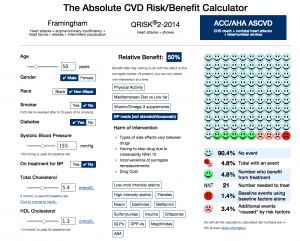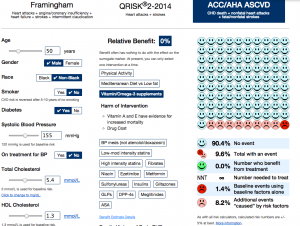Absolute risk/benefit calculators
An interesting interactive calculator for heart disease/stroke risk, from the University of Nottingham. It lets you put in basic, unchangeable factors (age,race,sex), modifiable factors (smoking, diabetes, blood pressure, cholesterol), and then one of a set of interventions
Here’s the risk for an imaginary unhealthy 50-year old taking blood pressure medications
The faces at the right indicate 10-year risk: without the unhealthy risk factors, if you had 100 people like this, one would have a heart attack, stroke, or heart disease death over ten years, with the risk factors and treatment four would have an event (the pink and red faces). The treatment would prevent five events in 100 people, represented by the five green faces.
There’s a long list of possible treatments in the middle of the page, with the distinctive feature that most of them don’t appear to reduce risk, from the best evidence available. For example, you might ask what this guy’s risk would be if he took vitamin and fish oil supplements. Based on the best available evidence, it would look like this:
The main limitation of the app is that it can’t handle more than one treatment at a time: you can’t look at blood pressure meds and vitamins, just at one or the other.
(via @vincristine)
Thomas Lumley (@tslumley) is Professor of Biostatistics at the University of Auckland. His research interests include semiparametric models, survey sampling, statistical computing, foundations of statistics, and whatever methodological problems his medical collaborators come up with. He also blogs at Biased and Inefficient See all posts by Thomas Lumley »


Not really a limitation of the app rather the research base. I thought it rather nice that they’re open about it in their “Where do the estimates of benefit come from?” section:
“Combinations of the above interventions – Nobody really knows but hopefully there is some sort of additive benefit. If you have data on this or a way this can be shown or calculated please let me know.”
Seems groovy.
10 years ago